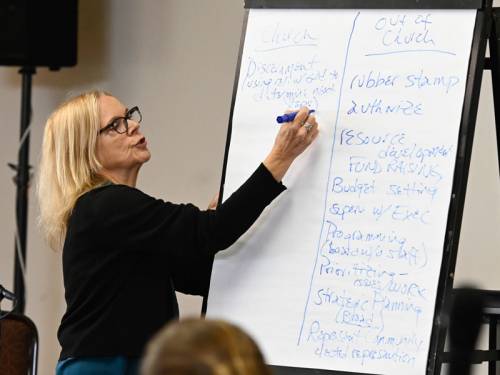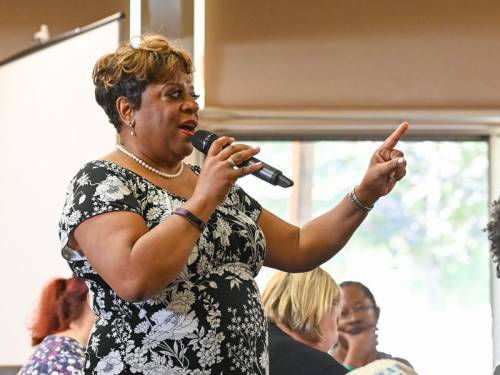Consultant, Moffett encourage board to deepen its role as Christ’s ambassadors
by Mike Ferguson | Presbyterian News Service

The Rev. Shannan Vance-Ocampo led worship Saturday for her colleagues on the Presbyterian Mission Agency Board. (Photo by Rich Copley)
STONY POINT, New York — Members of the Presbyterian Mission Agency board spent their final morning together Saturday in two important contexts: worship and board development.
Leading her colleagues in worship, the Rev. Shannan Vance-Ocampo used a discipline called spiritual gazing. While displaying a variety of images — an endangered whale, a struggling farmer, ecological devastation — she asked worshipers to allow the images to “help you hear Scripture and hear where God is taking you.”
“If we choose to follow Matthew 25, they are going to come for us,” she said. “We are choosing to follow Jesus, not this world.”
She concluded the spiritual gazing exercise with a drawing from a child in McAllen, Texas. It depicted immigrant children locked in a cage and being watched by armed guards.
“What are we called to be in the midst of this?” Vance-Ocampo asked her fellow board members.

The Rev. Dr. Laurie Ferguson leads the PMA board through a board development exercise Saturday at Stony Point Center. (Photo by Rich Copley)
Following worship, the board’s consultant, the Rev. Dr. Laurie Ferguson, a fourth-generation Presbyterian pastor and licensed clinical psychologist with experience in organizational and leadership development, led a two-hour board development discussion. She outlined 10 responsibilities for boards that oversee nonprofit organizations, including selecting, supporting and evaluating the chief executive; monitoring and strengthening programs and services; ensuring there are adequate resources; building a competent board; and enhancing the organization’s public standing.
Out of the ensuing conversation, board members identified some key roles they can play. They see themselves as ambassadors for the PMA, people with responsibility for telling the agency’s story. Board members are called to be in relationship with other boards within the Presbyterian Church (U.S.A.) — including with commissioners to General Assembly as they’re elected and begin preparing for the 224th General Assembly, which meets in Baltimore June 20-27, 2020.
After they’d brainstormed about their roles, the Rev. Dr. Diane Moffett, the PMA’s president and executive director, told board members she trusted that Stony Point’s peaceful setting — a place where “we can put on our comfortable shoes and let our hair down,” she said — had helped them focus on their work and feel good about their board service.

The Rev. Dr. Diane Moffett, president and executive director of the Presbyterian Mission Agency, speaks to the PMA board Saturday morning. (Photo by Rich Copley)
When she came to her position 15 months ago, “I heard so much rumbling and angst about what was going on. I think some board members were tired,” she said. The Matthew 25 invitation has allowed churches and mid councils — and boards, including the PMA board — to organize behind the work to be done in building congregational vitality, dismantling structural racism and eradicating systemic poverty.
“It’s time to re-brand who we are as the PMA and be concerned about how the gospel gets lived out,” Moffett said. “Everything we do has to be in service to how we are in the world as the church.”
As the PMA board has grown smaller, “we need to grow larger in terms of our understanding … When we understand how to communicate more effectively, we will be a better board.
“This has been a very important conversation,” she said of the board’s work together on Saturday. “I want to say ‘bravo’ and ‘let’s continue to get clarity to impact the world with the gospel.’ We have to be spiritual leaders — learning, discerning and praying.”
Every board member “has a life” outside of his or her service to the denomination, she noted.
“There needs to be a call to this board,” she said. “To say yes to this and to give it your all, it has to be a second position, a second layer of responsibility. If you’re going to be effective, there has to be a commitment to do this, and that’s why I like to say ‘thank you’ to people who are doing this.”
“Because we are the arm of mission,” Moffett said, “we are responsible for helping this denomination grow and develop.”
For her part, Ferguson encouraged board members to “stay in the lane you are in as you continue to be Christ’s ambassadors. This (process) feels alive. Continue working on it so it’s a living document for you.”
![]() You may freely reuse and distribute this article in its entirety for non-commercial purposes in any medium. Please include author attribution, photography credits, and a link to the original article. This work is licensed under a Creative Commons Attribution-NonCommercial-NoDeratives 4.0 International License.
You may freely reuse and distribute this article in its entirety for non-commercial purposes in any medium. Please include author attribution, photography credits, and a link to the original article. This work is licensed under a Creative Commons Attribution-NonCommercial-NoDeratives 4.0 International License.